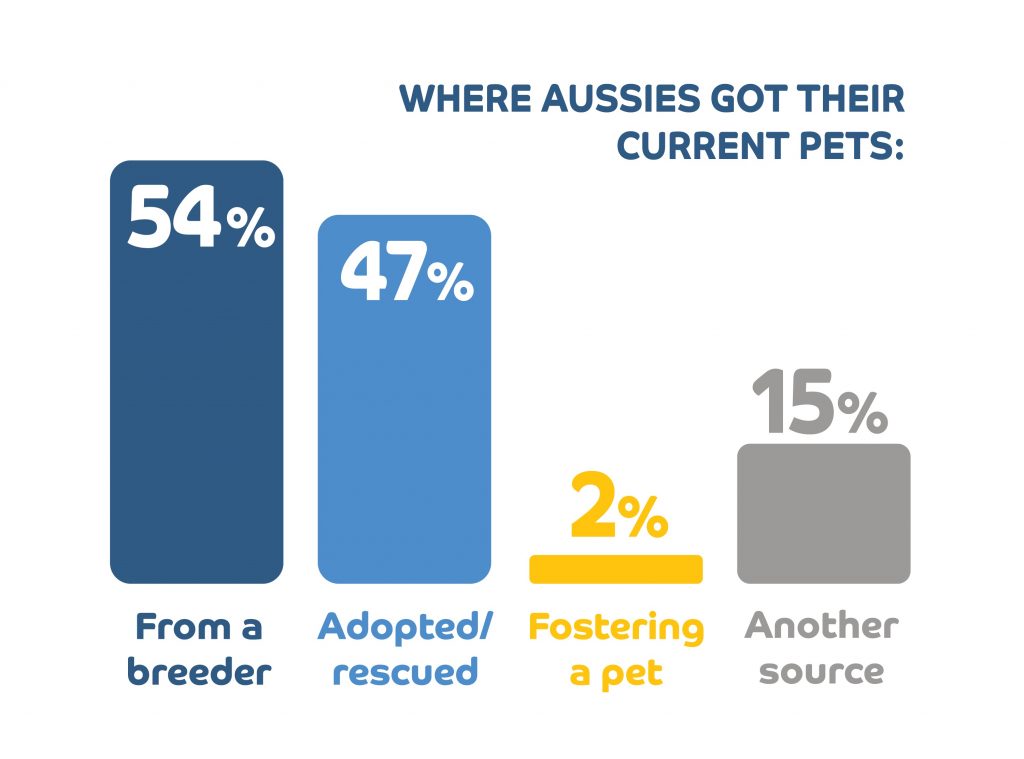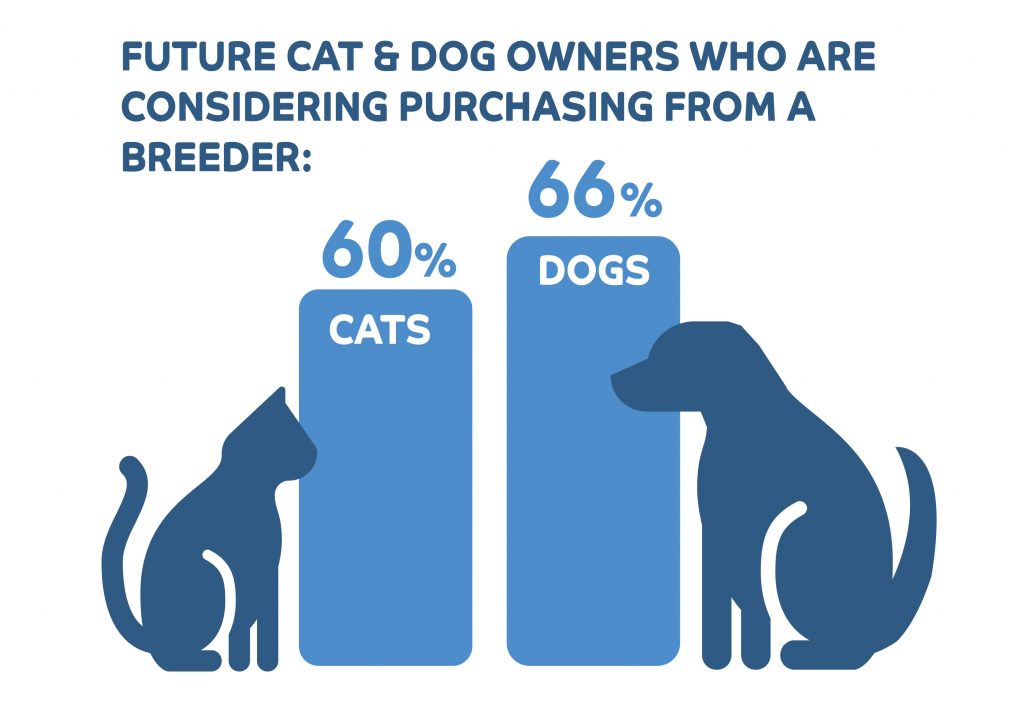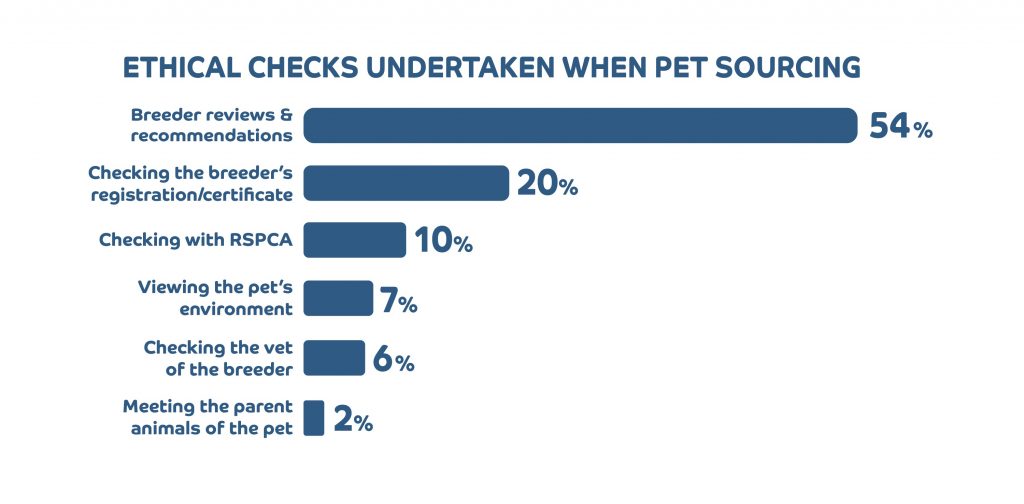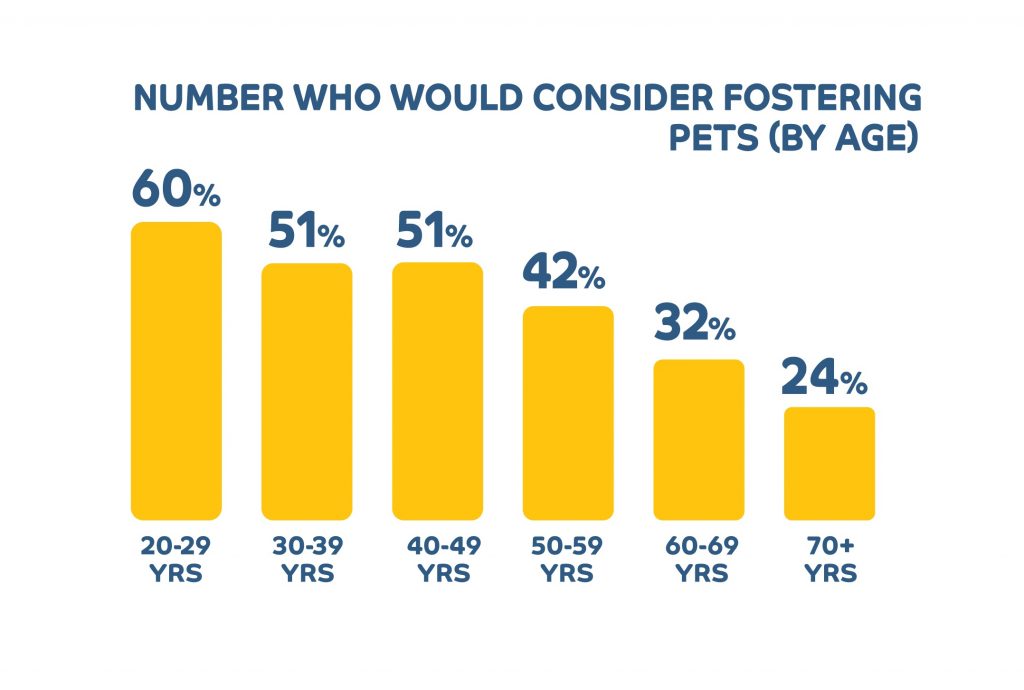When it comes to adding a set of furry legs to the household, individuals are faced with the decision of where to look to for a new pet. An often divisive topic, there are those who wholeheartedly believe in the single source of adopting from a shelter. Then there are those whose ideas of what a pet should be stop them from considering adopting. In our recent poll we found that half of Australians would look to a breeder or supplier for a pet, with family households, closely followed by older Australians, the least likely to adopt or foster. So, what impacts the decision of where to get your pet from? What Aussies are most likely to shop or adopt, and why?
Nearly half of Australia’s current pet owners either adopted or rescued their animal from a shelter or as a stray (47%), over half opted to purchase from a breeder. One animal welfare organisation, the RSPCA, reported in the 2018-2019 year that they alone rehomed over 12,000 dogs and more than 31,000 cats nationally. Add to that the countless other shelters and organisation finding homes for animals every year, and it’s clear that adoption or fostering a pet is a great way to find the pet you’re looking for.

So, do people still buy pets?
With nearly 7 out of 10 Aussies currently owning a pet, it’s clear we love having four-legged family members, and with so many existing animals available for homing, it seems less likely that there would be demand for pets available for purchase. However, of current pets in Australia, more than half were purchased through suppliers/breeders (54%). This was truer for dogs, with 66% of current dog owners having purchased their pet, compared to just 44% of cat owners. Maybe that’s because we tend to think of dogs developing more invasive behavioural issues than cats, and so the purchase of a puppy from a breeder comes with a perceived safeguard, compared to the unknown factors of a shelter dog. But is buying from a breeder providing a guarantee of the temperament of your new family member?
Of course, some owners have had their pet for some time now, so it is possible that they could now be less likely to get a pet from a breeder/supplier in the future, even if their current pet came to them in this way. However, the rates are still fairly high for prospective pet owners – 60% of people who are thinking of getting a cat, and 66% of people who are contemplating a dog, are considering doing so through a breeder or supplier.

Are we being as ethical as we could be?
With all the publicity on the treatment of animals by breeders/suppliers, you might expect that future pet owners are trying their best to ensure the source is ethical. Well, over 77% of Australians agreed that they would conduct some form of ethical checks, however the majority of respondents failed to suggest they would perform the checks most recommended by animal welfare agencies. Over half mentioned using reviews or recommendations on the supplier/breeder obtained via their own research or via a breeder’s association (54%). Around 20% suggested they would check the breeder’s registration/certificate. While one in ten Aussies were completely unsure about what checks they would conduct.
To have a clear understanding on the ethical standards of the place that you are purchasing from, as well as to best understand the temperament of your new pet, it is suggested that owners-to-be should view the environment the animal was born/raised in. However, only 7% of potential pet owners suggested that they would conduct this check, and only an alarming 2% stated that they would meet the parents of the pet – another highly recommended check, especially as a gauge of what behavioural traits their new animal may have.

The perfect family pet…
Families are the most likely household type to have purchased their current pet from a breeder or supplier. Interestingly, they are also the least likely to conduct ethical checks. With fair reason, families may be the most concerned about a pet’s character – how the animal will interact with children (65%) was the second most important consideration for this group when choosing a pet after ensuring the pet fits the household lifestyle (73%). Ideally, if families want their desired pet, they should strive to meet the pet’s parents to assess the temperament of the genes that their pet has inherited. A preference for breeders/suppliers from the family segment may also stem from the desire to have a young pet (a puppy or kitten), which was much more common for this group than for other household types.
Finding a ‘quality pet’
The people who consider breeders as an option all valued the perceived ‘quality’ and an animal’s known history as the main reasons to purchase a pet in this way. Older Australians expressed concern about adopting or rescuing a pet as being too much work to fit in with their current lifestyle but were also one of the groups most likely to want take on the challenges of a puppy or kitten. Interestingly, of the small percentage of respondents who admitted regret about their pet choice, there was an even spread between pet adopters and pet buyers, with those who had purchased their pet expressing a higher level of regret. It seems choosing to go through a breeder does not guarantee the benefits that are commonly thought true of this method. The concept of ‘knowing what you’re going to get’ is a hard thing to prove, especially if appropriate checks aren’t carried out.
Animals in shelters on the other hand, have a recorded history of what their traits are and what their life has been like so far. As one respondent put it, it is important “knowing that the pet has been exposed to children, is sociable and has a good temperament”. When pets are purchased as puppies or kittens, it can seem impossible to prove these factors, but an adoptive pet often comes with those answers. Pet shelters and organisations treat each animal as individuals, each with a set of specific traits. Staff are especially guided in matching prospective owners with pets that fulfil their needs, so the chances of finding your best-suited fur friend is potentially higher than picking one of a litter.
Foster a future…
So what about all the animals whose history is a mystery? In lieu of an accurate record, there’s no better way for shelters to know than through fostering! A vital tool for animal rescue and rehoming organisations, fostering is critical to both assimilate and find suitable homes for animals, as well as controlling shelter occupancy levels. Foster-pets make up a small proportion of currently homed pets in Australia (only 2%) but maybe they could be more common, as they present an opportunity for people considering pets to understand the positives and negatives of pet ownership whilst helping out some paws in need.
Overall, 43% of Australians said they would consider fostering a pet. Females are slightly more likely to consider it, and people aged 25-29 years were significantly more interested in fostering than other age categories. In fact, it seems that older generations are much less likely to consider this as an option, with those aged over 50 years significantly less likely to think about fostering (30%), compared to those under 50 years (51%). Once again, the likeliness of wanting a kitten or puppy rather than an older pet was also more likely in the older age categories, so information on the support provided and known factors of a potential foster pet from organisations might play a part in converting this household group looking for companionship. As well as fostering more, Australians aged under 30 have also adopted more pets compared to those aged over 30 who show preference to purchasing.
Of the 57% of Australians who said that they would not consider fostering an animal, 42% would still be in consideration of adopting/rescuing one. Why is this? Well the main concern of fostering was becoming too attached to the animal, and therefore the heartache of giving it back! With many pets being taken to or returned to shelters, due to owners being unable to manage them, fostering seems like a win-win situation if you have the means and interest to get a pet or looking for some love and affection. If you bond with your foster pet and they suit your lifestyle, you can keep them, and if not then there is no shame when they end their stay with you and the added benefit of knowing you helped the organisation in learning the pets needs and traits .

The benefits of adopting a pet or fostering one for a little while.
The overwhelming answer when current owners were asked about the most beneficial aspect of having a pet was that they had received more ‘love and affection’ (72%), followed by ‘companionship’ (61%). Other equally positive responses included ‘improved mental health’ (39%), ‘increased physical activity’ (33%), ‘decreased stress levels’ (30%) and a ‘lessened feeling of loneliness’ (28%).
With all those benefits who wouldn’t want a pet! We asked what had stopped people from buying, fostering or adopting a pet so far, and while a common reason was due to living arrangements (20%), there were quite a number that said ‘nothing at all’ (12%). That’s good news for animal shelters, in that there may be plenty of people that can be encouraged into adoption or fostering. One respondent suggested they might be swayed to adopt or foster if there was “more publicity, such as targeted emails on dogs which suit my preference”.
So whether you want to expand your pet family, or are thinking of a first pet, it’s important to consider that there may be more options for finding your four-legged friends than first thought. Understanding the benefits of all sources, and ensuring we choose pets as ethically as possible, whether it be through a breeder, supplier or animal shelter, will help us all find the perfect paws that we’re looking for.
Survey conducted by Ekas with 1384 participants in Australian on 06/06/20.
